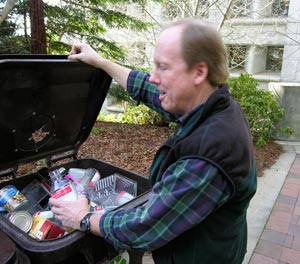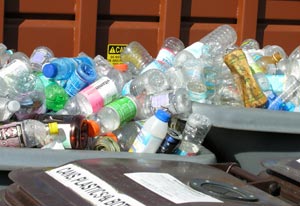UCSC has thrown down the gauntlet (and will put it in the recycling bin later) by entering for the first time in ReycleMania, an annual friendly competition among college and university recycling programs nationwide.
The 2008 competition has officially started, with more than 400 schools across the country participating to see who can motivate their campus communities to recycle more and reduce overall waste over a 10-week period. The contest began Jan. 27, and initial rankings were posted Feb. 8.
Results will be reported weekly on Fridays on the RecycleMania web site.
"We want to get involved and start a stronger culture of recycling on campus, and we thought this would be a way to do it," said UCSC Recycling Coordinator Dave Wade.
RecycleMania has MySpace and Facebook pages to help schools network and to promote the competition and waste reduction. And Wade is looking into other promotional ideas to get people recycling, such as tabling.
Meantime, the Grounds Services Recycling Program is setting out more containers to handle the anticipated increase in recycling material, hiring more student assistants to help with the pickups, and dedicating more equipment to transport the additional amounts of recycling it expects.
"We have every expectation that we will have a huge response throughout campus to this competition," said Dean Raven, grounds manager.
The overall purpose of the competition is to increase recycling awareness, but that doesn't mean there isn't room for a little smack-talk.
Last year, UC Davis, a contestant since 2004, chided RecycleMania rookie Stanford University by making a YouTube video that called the Cardinals "newbies."
"We had a little fun," said Lin King, program manager for the R4 Recycling Program at UC Davis, with a laugh. "But it's more for educational promotion, and that's what we use it for. It's not so much to go out there and be number one--although we wouldn't mind."
The video, though in jest, served its purpose.
"That riled some people up," said Julie Muir, community relations manager for Peninsula Sanitary Service, Inc., Stanford Recycling Center.
She'd been egged on by her colleagues at Harvard and Yale for many years to get on board with RecycleMania, said Muir.
As it turned out, she said, "people just loved it. I can't express how surprised I was that they weren't offended by it, they weren't pooh-poohing it, they wanted to know where we were in the standings. But it was also very humbling because we didn't win."
Stanford did make a fine showing, however, coming in second in the "Gorilla Prize," which honors the school that recycles the highest gross tonnage of materials during the competition, and third in the "Targeted Material--Paper" category.
During the competition, campuses go head-to-head in different contests to see which institution can collect the largest amount of recyclables per capita, the largest amount of total recyclables, the least amount of trash per capita, or have the highest recycling rate.
The per capita competitions level the playing field, said Wade.
"That way a small school can compete with a larger school," he said.
RecycleMania began in 2001 when Ed Newman of Ohio University and Stacy Edmonds Wheeler of Miami University decided that something had to be done to increase recycling in the residence and dining halls on their campuses. The first year, Miami University won the competition over Ohio University.
Since then, the program grew rapidly in participants each year and expanded to include various contests. In 2007, the number of contestants more than doubled over the previous year, with 201 schools battling for RecycleMania glory. That year, the effort produced 41.3 million total pounds of recycled materials, up from approximately 18 million pounds in 2006.
This year, the number of competing schools has doubled again. Participating schools in California have quadrupled, going from 8 in 2007 to 32 this year.
Only Montana, Nebraska, Kansas, and Alaska do not have participating schools.
Beside UCSC and Davis, UCs competing are Irvine, Merced, San Diego, and San Francisco.
Big-name schools are in the game, including Rutgers, Harvard, and Princeton, but so are less-well-known institutions: Agnes Scott College in Georgia, for example, and Bemidji State University in Minnesota.
The goal is to raise awareness and get students, faculty, and staff recycling, UCSC's Wade said.
"Recycle," he said, when asked how the campus community can help the cause. "Recycle every day. Recycle all your bottles and cans. Recycle all your paper. If you have to take an extra step to do that, do it anyway."
But hey, it's a competition. Winning would be great, too, and Wade is setting his sights high.
"In my heart of hearts, I'd really like to beat Davis," said Wade, referring to the school known for environmentally forward practices such as instituting a zero-waste policy at its football stadium.
But, he laughed, "we don't have a prayer."
For more information, contact Dave Wade at 459-3671 or the Physical Plant work order desk at 459-4444.
RecycleMania is supported by the U.S. Environmental Protection Agency's WasteWise program and the National Recycling Coalition (NRC), and is coordinated as a project of NRC's College and University Recycling Council. The Coca-Cola Company is a major sponsor of RecycleMania, helping underwrite the administrative costs of the competition and providing a design firm for promotional materials for schools and the MySpace and Facebook sites.




